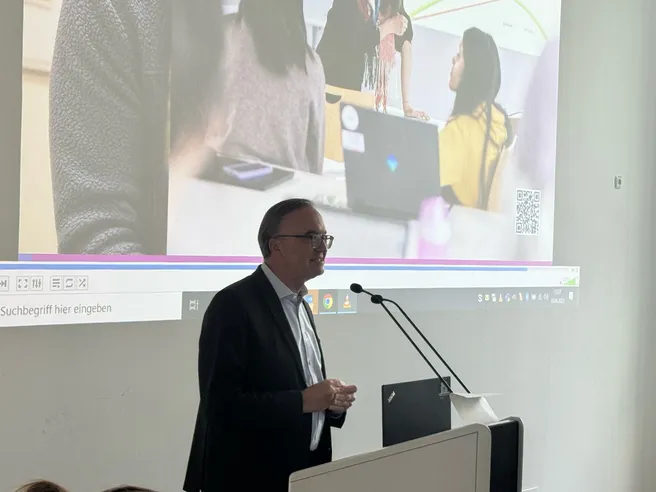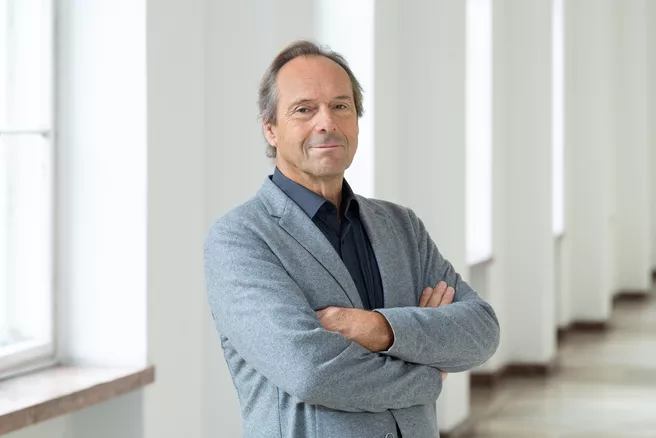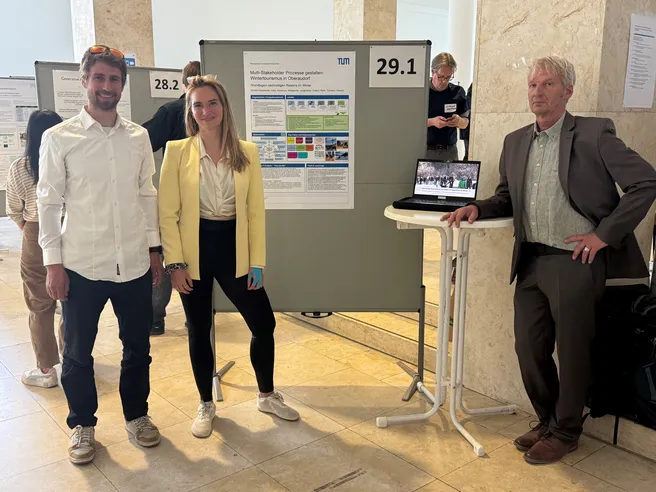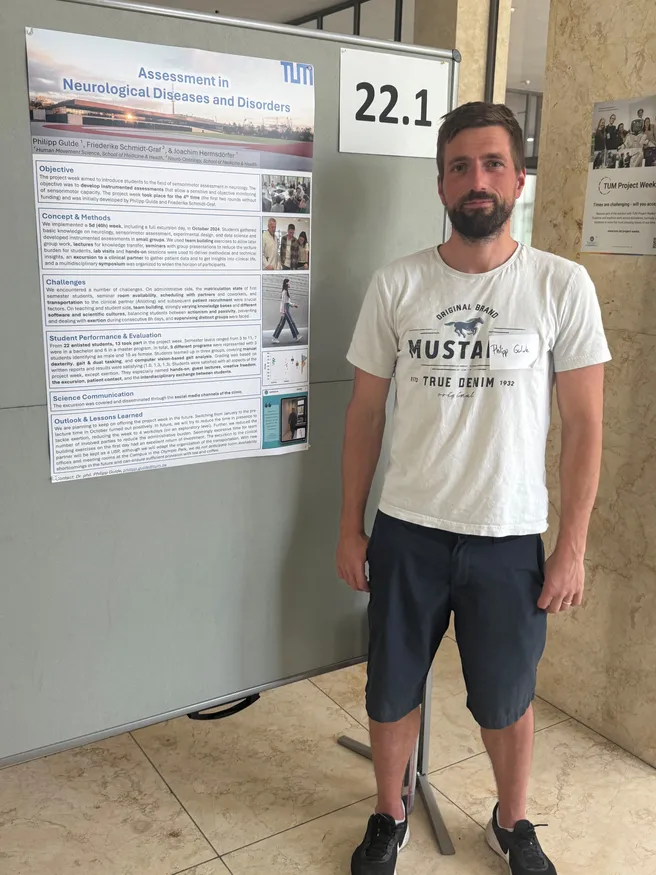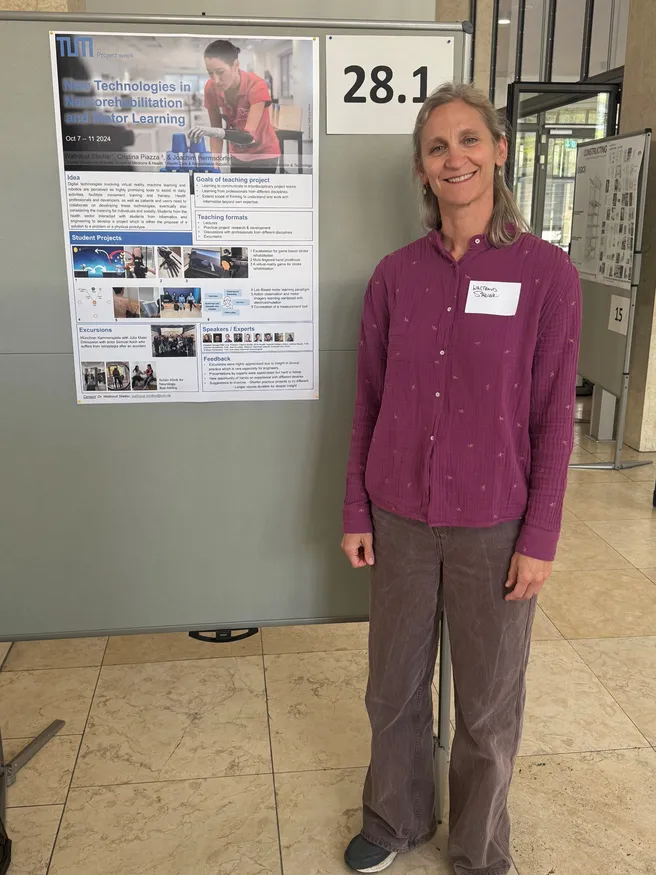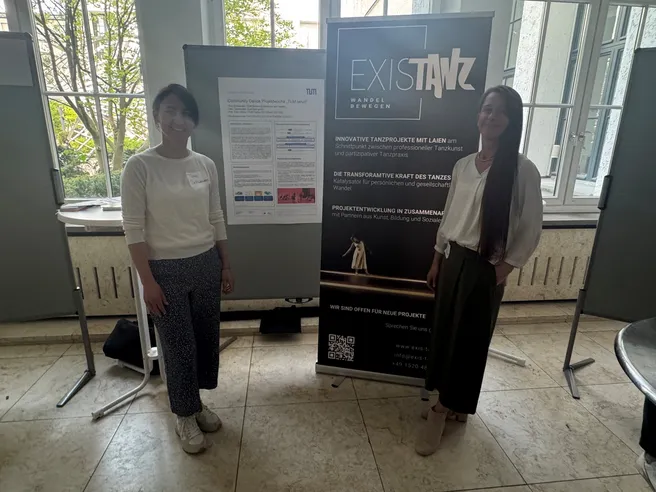Since its launch in the winter semester 2022/23, lecturers at TUM have developed over 100 innovative project weeks that enable students to work on a project-based, collaborative, and interdisciplinary basis. The focus is on key future topics such as Artificial Intelligence, Health, Sustainability, Technology & Culture, Entrepreneurship, and, of course, Sport.
More than 40 of these diverse projects were presented on April 30, 2025, from 12:00 p.m. to 4:00 p.m. at the Fair of Ideas in the Enrollment Hall at the Main Campus. The program officially began at 1:30 p.m. with an address by Prof. Gerhard Müller, Senior Vice President for Academic and Student Affairs: “Project-based learning enables instructors to use carefully chosen tasks to highlight perspectives that go beyond individual disciplines and help foster an understanding of other fields. At the same time, it offers a space to critically examine how new technologies might transform value creation processes and serves as a testing ground for cross-location and interdisciplinary teaching formats. It’s great to see how creatively and diversely the format has been implemented.”
Afterwards, visitors had the opportunity to engage directly with the project teams, gain inspiration, and network.
Prof. Dr. Joachim Hermsdörfer, Department Head and Chair of Human Movement Science, explains: "Especially in research fields like those at our Department of Health and Sport Sciences, collaboration across different disciplines is essential. The project weeks, with their genuine interdisciplinary approach, are thus an immensely valuable extension of our subject-specific degree programs. Moreover, inviting experts and visiting relevant institutions provides students with important new insights beyond their academic studies."
Among the projects presented by the Department Health and Sport Sciences, TUM School of Medicine and Health (MH), were:
Assessment in Neurological Diseases and Disorders
Prof. Joachim Hermsdörfer, Dr. Philipp Gulde, Prof. Dr. Friederike Schmidt-Graf (Chair of Human Movement Science; TUM Hospital, Neuro-Oncology).
Prevention — from risk reduction to rehabilitation — requires the collaboration of many disciplines: medicine, sport and health sciences, computer science, engineering, sociology, and more. Particularly in the field of assessment in neurology, there are numerous points of intersection. During an intensive project week, 13 students from nine different degree programs explored the fundamentals of neurology as well as clinical and technology-supported assessment methods. In interdisciplinary teams, they developed their own instrumented tests, which they applied during an excursion involving a small sample of neurological patients.
New Technologies in Neurorehabilitation and Motor Learning
Prof. Joachim Hermsdörfer, Prof. Cristina Piazza, Dr. Waltraud Stadler (Chair of Human Movement Science; Healthcare and Rehabilitation Robotics).
Emerging technologies such as Virtual Reality, Machine Learning, and Robotics offer promising tools to facilitate motor training and therapy. However, for these instruments to be successful, they must be tailored to individual therapy goals and user requirements. Thus, it is crucial for experts from health professions, movement sciences, technical development, as well as patients and users to collaborate and jointly advance these methods. In this project, students from diverse academic backgrounds practiced exactly this type of interdisciplinary collaboration by developing a prototype product to support neurorehabilitation and motor learning.
Sensors and Wearables for Automated Detection of Nutrition, Physical Activity and Sleep
Prof. Karsten Köhler, Prof. Daniel Roth, Dr. Benjamin Busam, PD Dr. Christoph Höchsmann, Dr. Leon Brudy (Assistant Professorship for Exercise, Nutrition and Health; Professorship for Machine Intelligence in Orthopedics; Chair for Computer Aided Medical Procedures & Augmented Reality).
This project week combines theoretical knowledge with practical application. In the theoretical part, students receive a concise introduction to nutrition, physical activity, and sleep — and their importance for health and well-being. Students are also given an overview of traditional assessment methods and modern sensors and wearables used for automated data collection in these areas. During the practical phase, interdisciplinary teams (e.g., from health sciences, medicine, computer science, or management) independently develop project ideas and formulate research questions. They then collect their own data using various measurement methods, analyze it with the support of the instructors, and present their findings at the end of the week.
Sustainable Group Travel for Children and Adolescents in Winter
Prof. Dr. Jörg Königstorfer, Dr. Thomas Froschmeier, Dr. Karina Konieczny, Dr. Carina Olufemi, Thomas Plank, Dr. Andreas Thomann, Martina Wayand (Chair of Sport and Health Management; Operational Unit Applied Sports Science; Student Office; ZHS).
This module allows students to gain in-depth insights into sustainable winter tourism and develop innovative solutions. A key focus was the creation of group travel concepts for scenarios both with and without snow reliability, emphasizing the design of multi-stakeholder processes and the optimal use of local infrastructures for sustainable activities, particularly for young people.
Tina Schwender (Operational Unit Applied Sports Science) also presented the project week "Community Dance", in collaboration with Ellen Steinmüller (ExisTanz gUG). The offering for students is part of the initiative "TUM Dances", which was coordinated in cooperation with Prof. Felix Mayer (TUM Center for Culture and Arts) and will take place in June 2025. The aim of the project is to make dance accessible and tangible as a part of cultural and aesthetic education within the TUM community.
In addition to individual course projects, entire school programs, international formats such as the EuroTeQ Collider, and funded contributions from the TUM Ideas Competition will also be presented.
The Fair of Ideas also marks the launch of new project weeks for the upcoming winter semester 2025/26, in which students will once again work in interdisciplinary teams on topics in AI & Digitization, Creativity & Design, Health, Social Issues, Entrepreneurship, or Sustainability.
To the TUM Project Weeks Homepage
Contact
Department Health and Sport Sciences
Georg-Brauchle-Ring 60/62
80992 Munich
Phone: +49 89 289 24601
Email: deans.office(at)mh.tum.de
Text & Photos: Bastian Daneyko
